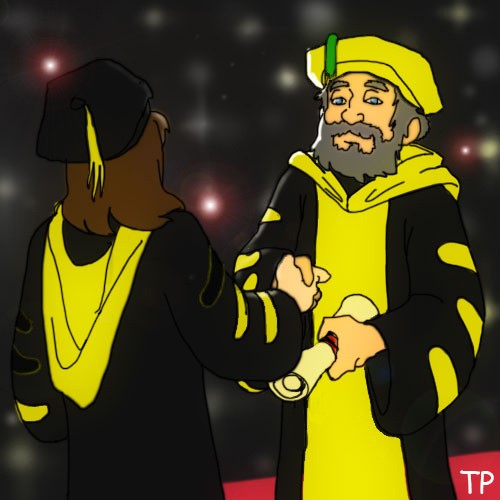Graduate School: First accredited university to award a professorate degree. Presently, the higher
your college degree, the more narrow your education. Bachelor degrees are the most broad and even force students to explore academic fields outside of their field of interest. Master's degrees narrow one's education to just one academic field, doctorate degrees narrow that even further, and post-docs narrow it still further.
"The metaphorical leaps that we consider of significance tend to take place in the interstices of different disciplines. Working against this essential force of creativity, however, is the pervasive trend toward ever greater specialization in the sciences (and just about every other field as well)."
Or as mathematician
Norbert Weiner said in his book
Cybernetics (which Mr. Kurzweil also quoted him saying in his own book above):
"There are field of scientific work, as we shall see in the body of this book, which have been explored from the different side of pure mathematics, statistics, electrical engineering, and neurophysiology; in which every single notion receives a separate name from each group, and in which important work has been triplicated or quadruplicated, while still other important work is delayed by unavailability in one field of results that may have already become classical in the next field.
It is these boundary regions which offer the richest opportunities to the qualified investigator. They are at the same time the most refractory to the accepted techniques of mass attack and the division of labor."
The professorate degree solves the above problem by expanding a person's education back out to make them well-rounded experts in their specific academic pursuit by forcing them to get seven doctorate degrees in different-yet-related academic fields.
At the graduation ceremony for an "ordinary" doctorate degree, a declared professorate student would, in addition to their diploma, receive a gold chevron for their doctorate academic gown. Their diploma given by the university's chancellor and the chevron given by either the dean of the college they received their new doctorate degree from or the chair of the academic department that degree is from. The professorate student would then be required to change one of their gown's black chevrons to their new gold one. Doctorate graduation gowns have three chevrons on each sleeve. As the student acquires another doctorate degree, another of these chevrons does this color flip. When the student has acquired their seventh doctorate degree and thus their professorate degree, the front black velvet panels of the gown and their entire hat changes to gold with the hat's tassel in the traditional color of their seventh degree. And once this tradition gets started, expect chancellors who have professorate degrees to no longer wear gowns that have four chevrons on the sleeves, as many chancellors do today. Doing so would then disrespect their professorate degree and all those who possess professorate degrees. Instead, expect these professorate chancellors to find another way to distinguish themselves from professors at graduation ceremonies. [Jack Decker, BTC's creator, suggests giant clown shoes ... but he isn't holding his breath that this will be the new chancellor tradition.]
Eventually in academia, expect only college teachers possessing a professorate degree will be called "professors" and be able to receive tenure. The rest of the college teachers will be then referred to as merely "lecturers." Universities will then seek out professorate graduates to staff their faculties to indicate how learnt their faculty is as opposed to their competition. That and for pride and prestige.
This new degree is not meant for the average person to be able to acquire but for those with genius-level intellects. It is meant to challenge the highly gifted amongst us. To give them a goal worthy of their abilities. Most highly gifted students breeze through education getting their doctorate degrees with, for them, little effort or time. This new degree changes that. For a "normal" person to acquire a doctorate degree, it would typically take seven years. So for a "normal" person to get a professorate degree, it would take them at least twenty-five years (four years for their first bachelor's degree and three years for each doctorate). Saying the person started college at the age of 18, they would still be in college by the age of 43. That would not be acceptable or possible for most people. However, for highly gifted students, they will likely be able to acquire a professorate by at minimum the age of 30, if not likely much sooner.
Future Challenges: 1) First person to receive a professorate degree.
2) First person of the opposite sex to receive a professorate degree.
3) First person to receive a professorate degree in artificial intelligence.
4) First university to employ a person with a professorate degree as one of their professors.
5) First university to make it a policy to only give the title of "professor" to those possessing a professorate degree and employed by it to teach.
6) First university to make it a policy to only give tenure to those possessing professorate degrees.
7) First person having a professorate degree to receive a Nobel Prize in medicine or hard science.
First person to get a professorate degree under the age of:
8) 19
9) 18
10) 17
11) 16
12) 15
13) 14
14) 13
15) 12
Not sharing doctorate degrees between them, the first person to earn:
16) Two professorate degrees.
17) Two professorate degrees AND be under the age of 19 years.

